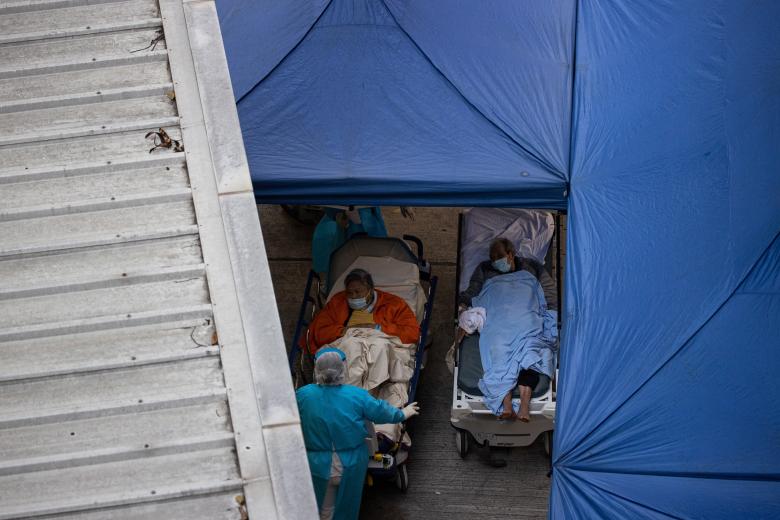HONG KONG – With the Covid-19 outbreak spreading to many of the city’s elderly care homes, experts are divided over how to quell the rising death toll among seniors.
The worsening outbreak has been compounded by a sluggish vaccination rate among seniors, as well as a lack of vaccines and isolation facilities – a combination of factors that could be lethal for these elderly residents, some experts said.
Dr David Owens, a family medicine practitioner, told The Straits Times that vaccinating more vulnerable people and care home residents “remains a priority even at this late stage”.
The government’s move to ban unvaccinated people from eateries, shopping malls and supermarkets from Feb 24 prompted more seniors to volunteer for the jabs, but their numbers were dismal.
About 66 per cent of those aged 70 and above have had at least one jab, while 49 per cent of those aged 80 and above have had the first dose.
The vaccination rate is far worse at a mere 20 per cent in elderly care homes, which have an estimated 70,000 residents.
“Although by nature I am not a fan of mandates, in this context, I think opt-out and time-limited mandates targeting the highest risk population are ethically justifiable in order to save lives. which may be lost in the greater population if our hospital system breaks down,” said Dr Owens.
Hong Kong has about 1.5 million residents aged 65 and above, according to government data.
On Wednesday (March 2), Dr Albert Au of the Centre for Health Protection said those aged 80 and above accounted for about two-thirds of the Covid-19 deaths, with the fatality rate among the elderly “much higher” than the younger population.
“The government has liaised with the social welfare department to launch programmes to increase the vaccination coverage among the residents, as well as the staff,” he said.
The government is also providing on-site vaccinations to care home residents, and the Department of Health has opened up the elderly health centres to provide the free jabs, said Dr Au.
So far, about 1,000 private doctors have been roped in to help vaccinate the elderly in the community via private clinics.
Dr Leung Chi Chiu, a respiratory medicine doctor, said full mobilisation of all private doctors “may help” the situation.
But he said that at this stage, isolation is more important than inoculation, because the Omicron variant of the coronavirus spreads faster than the time needed to complete two doses of vaccination.
“Vaccination in a ‘war zone’ is difficult when everyone is facing major infectious risk and occupied with caring and control tasks,” he said.
Given the lack of isolation facilities, infected seniors are left in the aged homes, which makes it difficult for the vaccination outreach teams to inoculate the uninfected, said Dr Leung.
He added that Hong Kong’s vaccination campaign targeting the elderly “started too late”, and now that Omicron has infiltrated most old age homes, the situation is hard to control.
So far, 670 care homes in the city are affected, with about 4,800 staff and residents infected.
Health experts have previously said that the government’s failure to step in quickly to correct misconceptions about the safety of vaccines has made sceptical seniors more doubtful of the jabs.
Such fears stem from reports of adverse reactions and deaths in the early days of the city’s inoculation programme.
However, vaccination aside, Dr Owens said the priority is to clear urgent care hospital facilities of people who do not need acute medical care, and to build intensive care units and emergency capacity.
“If hospital systems break down, mortality at all ages increases. The priority should be to protect the hospital system,” he said.
Hong Kong yesterday logged a new daily high of more than 55,300 cases and over 110 deaths. This takes the total to more than 293,000 cases and over 1,100 deaths.
